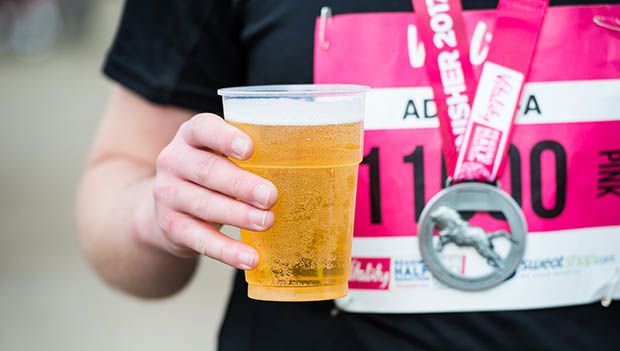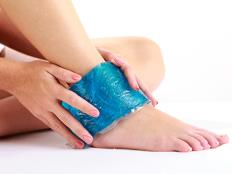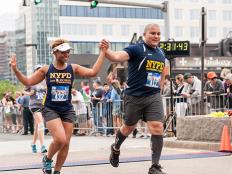
Athletes have lots of reasons for drinking alcohol; some simply enjoy the taste and others use it as a way to relax. While there's nothing wrong with the occasional drink, alcohol isn't exactly high-performance fuel. Every person metabolizes and reacts to alcohol differently, so while you might be fine with a nightly glass of red, it could have detrimental effects on your training buddy. Ready to navigate alcohol's pros and cons? We have you covered.
The Bad and the Ugly
One of the major downsides to alcohol is that it often replaces other nutrition. Since alcohol calories can't be converted to glycogen (your body's main energy source), they aren't helpful for fueling exercise. Instead, alcohol calories are often stored as fat and can increase your overall body fat percentage. With 7 calories per gram of alcohol, a drink can really pack a caloric punch. It's not unusual for stouts and IPAs to have 200-plus calories per 12-ounce serving while wine generally has about 150 calories per 6-ounce glass.
Alcohol can also contribute to dehydration, something no athlete wants to deal with. Alcohol is a diuretic, which means it moves fluids through your kidneys and bladder faster than usual. If you don't consume enough water and electrolytes, you'll become dehydrated.
A drink or two can also cause sleep disturbances. Initially, a drink might make it easier to fall asleep, but it usually means more disrupted sleep and less deep (i.e. restorative) sleep over the course of the night. Since most human growth hormone (HGH) is produced during deep sleep, you'll end up lagging in production if you drink. This can ultimately result in delayed recovery and muscle production.
Finally, if you drink the night before a run, you may experience a loss in hand/eye coordination and slower reaction times. If you run before sunrise or on bumpy terrain, this could be an issue.
Of course, there are also plenty of reasons to enjoy an occasional drink, so if you're ready to say cheers, it doesn't necessarily have to ruin your run!
If You Want to Limit the Impact
If you are going to drink, remember that timing can be everything. According to InsiderTracker, a company that studies biomarkers in athletes, "consuming five or more alcoholic beverages in just one night can affect your brain and physical activities for up to three days." Most of us aren't drinking that much regularly, but it's something to keep in mind when planning workouts and races. Data from WHOOP, one of the leading fitness trackers, cited data that agreed with that timing. In fact, its study found that in collegiate athletes, one night of drinking can suppress recovery for up to five (!) days.
Be cognizant of when you imbibe—a few drinks to celebrate finishing a goal race will likely be less detrimental than indulging the night before a big workout or when you're focused on recovery. If you want to imbibe, try to limit yourself to one drink and/or choose an option with a lower ABV. And of course, make sure to hydrate during and after you drink alcohol.
If You Want an Alternative to Booze
Athletic Brewing Company is a craft brewing company founded by and for athletes. Its non-alcoholic beers are widely available and taste great. The lineup includes award-winning IPAs, ales, and stouts. Or, if you're looking for a cocktail replacement, the Hella Cocktail Co. makes tasty bitters and soda options. And herbal tea or hot cocoa also works well if you're looking for a non-alcoholic pre-bed routine.
You don't have to completely give up alcohol if you enjoy it, but it's important to be mindful, especially if you're training for a specific goal.
READ THIS NEXT: 10 Health Benefits of Beer
Get ACTIVE on the Go


Couch to 5K®
The best way to get new runners off the couch and across the finish line of their first 5K.
Available for iOS | Android






Discuss This Article